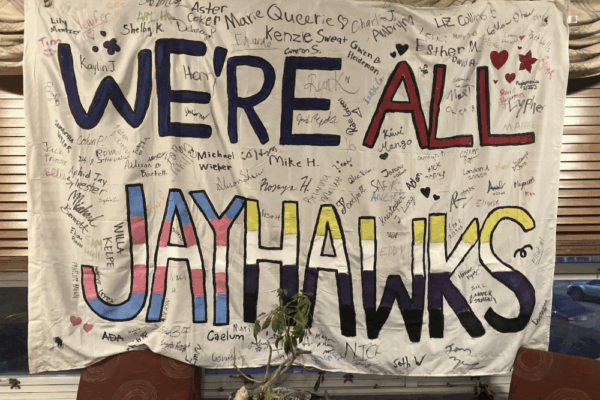The University of Kansas may be violating the First Amendment rights of student protesters at scholarship halls, attorneys told The Kansan.
Last week, some Grace Pearson Hall residents received an email violation notice from complex director Rebekah Love. The notice asked residents to remove sticky notes from windows in accordance with the housing handbook. Students left the notes, which displayed slogans like “GP for GIA.”
They were protesting housing’s decision to remove gender-inclusive assignments from Grace Pearson.
The handbook section cited in the email notice states that “decorations hung on windows should generally be directed to the interior of the room. Window decorations may not include personal identifying information of any person. Profanity or references to genitalia are prohibited.”
Attorneys said KU is allowed to make rules like this. However, they said there could be a First Amendment issue if these rules are not uniformly enforced across campus.
There are three types of free speech forums: traditional, limited purpose and non-public.
Harrison Rosenthal, a First Amendment attorney in Kansas City, Missouri, said dorm room windows are traditionally considered non-public forums, which are places that are not usually used for public expression.
However, non-public forums can become limited forums, where expression is allowed under a predetermined set of rules. An example of a limited forum is the public comment section at the city commission meeting.
Rosenthal said that if KU has allowed others to post sticky note designs in the past, then it has potentially made dorm windows into a public forum and could be violating the protesters’ First Amendment rights.
“If the school is selectively saying, ‘We’re not going to allow messages specifically with respect to that outwardly facing on the window, but we are going to let students to continue to post seasons greetings, holiday messages and rah rah, KU, all that stuff,’ that is a First Amendment violation,” Rosenthal said.
Kunyu Ching, a staff attorney with the American Civil Liberties Union of Kansas, agreed. “If the policy has been inconsistently enforced, or if the administration has allowed similar exterior-facing decorations or signs expressing other messages to remain up in other situations, then there may be an issue,” Ching wrote in an email.

